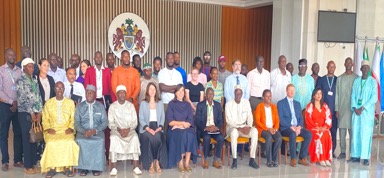
This groundbreaking initiative promises to reshape the country’s environmental policies, setting it on a bold path toward becoming a regional leader in sustainability.
Common Seas-UK supported the mission of the National Environment Agency (NEA) which had developed the National Action Plan (NAP) to tackle plastic pollution in The Gambia in a wider scope.
The historic initiative was also to ensure that The Gambia's environment and natural resources are sustainably managed and conserved for the benefit of all, including future generations, and to increase resilience to climate change.
Dr. Dawda Badjie, executive director of the National Environmental Agency, recalled that the Gambia in 2007 enacted Anti- the Littering Regulation which was meant to limit indiscriminate littering in the country and included plastics and related waste.
He added that the enactment was followed by the Ban on Plastic Bag Order 2015 which prohibited the importation of plastic, sales, manufacture, and use of single plastic bags in the country among others.
However, Dr. Badjie said the NEA had noticed a large proliferation of banned products entering illegally through their porous borders. “We are also concerned about the consequences this proliferation would have on Public Health and the Environment”, he pointed out.
Badjie said the National Action Plan would be implemented over 10 years and be reviewed after five years of implementation, adding that it would help NEA and partners to stay on track and identify gaps for improvement.
Baboucarr Bouy, the minister for Public Service, Administrative Reforms, Policy Coordination, and Delivery, noted that the government recognised the negative impact of plastic on the ecosystem and by far the food chain.
He added that it was needful to show their full commitment to the development of the NAP and its implementation and by extension signing different multilateral environmental agreements.
Minister Bouy pointed out the impacts of plastic pollution which included the alteration of habitats and natural processes, reducing ecosystems' ability to adapt to climate change.
“The impact also indicated the threats to ocean health and marine species, food safety and quality concerns, human health risks, and negative impact on coastal tourism,” Minister Baboucarr Bouy stated.
He expressed appreciation to Common Seas for partnering with the government of The Gambia through the National Environment Agency and others in coming up with an “effective, smart,” and implementable NAP 2024 – a 10-year plan with different strategies.
Thais Vojvodic, director of Government and Business Partnerships, Common Seas, said their mission was to stop the flow of plastic pollution to protect the ocean, health, and the future.
“We know that this is not a new problem. Plastic pollution is a problem that has been with us for a while and we know that a lot has already been done but we have been seeing plastic pollution rising very rapidly,” she said.
She added that the launch of the plan demonstrated The Gambia's leadership in taking a historic step. She indicated that having a plan that was comprehensive, overarching, long-term, and includes both upstream and downstream measures, shows that the country was becoming a front-runner in that space as it is taking action ahead of the adoption of the upcoming Global Plastics Treaty.
With plastic waste generation projected to rise by 42% in the coming 10 years, the Common Seas Director said the National Action Plan was instrumental in facilitating the urgently needed interventions to safeguard their beautiful surroundings and the well-being of the Gambian people.
“The strategies within the National Action Plan have the potential to reduce plastic pollution in the Gambia by an impressive 86% over the next 10 years”, she noted.





